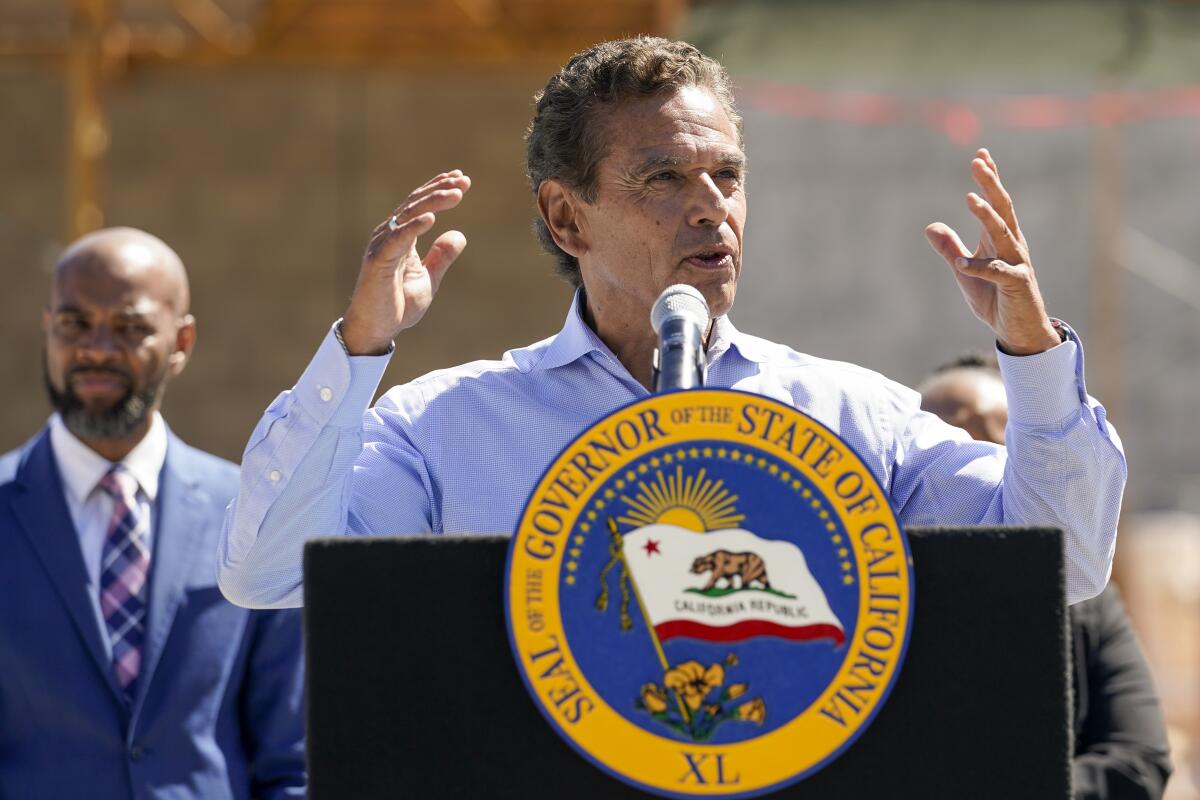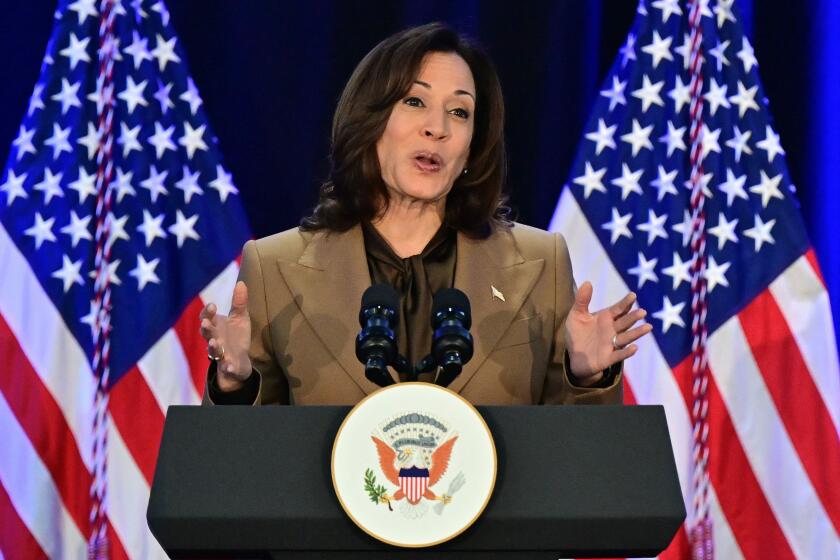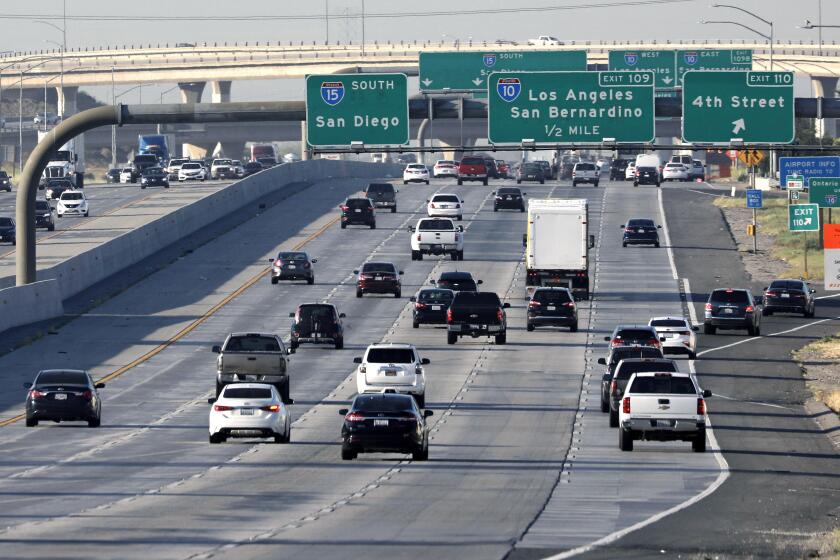California Politics: Antonio Villaraigosa is Newsom’s new infrastructure czar

Gov. Gavin Newsom declared Antonio Villaraigosa his new infrastructure czar Thursday in a shrewd political maneuver that brings one of his toughest rivals into the fold of his administration.
“Keep your friends close and your enemies closer” were the first words that came to mind when I heard the news.
That might be a bit of a dramatic flair, but it’s no exaggeration to say that Villaraigosa and his surrogates have been among the governor’s most outspoken critics in a party that prefers to muffle their disapproval of the powerful politician and praise him publicly.
For Newsom, it could be smart politics to try to neutralize intraparty critics when you’re positioning yourself as a possible Democratic presidential contender.
“He’s clearly trying to consolidate Democratic voices,” said Steven Maviglio, a Democratic communications strategist.
A ‘long overdue’ partnership
Newsom said “we’re lucky to have” Villaraigosa at a news conference on drought where he announced the appointment. He lauded Villaraigosa’s ability to draw down federal funding as mayor and said he will work with local and state leaders to do that again as an infrastructure advisor.
“We have resources,” Newsom said. “We have grants that we can match in order to draw down those funds, and we’ve got someone who’s going out there and hustling to get them.”
Villaraigosa said he was “honored to be working with” Newsom and praised his “game-changing” new drought plan.
But the relationship hasn’t always been so complimentary.
Though Villaragoisa placed a distant third behind Newsom and Republican John Cox in the 2018 gubernatorial primary, he mounted a tougher campaign against the governor than any other candidate. Running to the right of Newsom, Villaraigosa accused him of “selling snake oil” with his promise to enact a statewide single-payer healthcare system that the former L.A. mayor considered a pipe dream.
Tensions continued to linger after the election.
The governor’s political team reacted swiftly when Villaraigosa tweeted last year that California needed to reopen schools in the early days of the recall campaign. The missive created speculation that the former mayor might run as a replacement candidate in the race.
That appeared to spook Newsom’s advisors whose strategy to beat the recall hinged on their ability to keep all other well-known Democrats off the ballot and ensure voters didn’t have any viable alternatives to choose. Doing so allowed them to avoid a potential repeat of the much-debated Cruz Bustamante effect on the successful 2003 recall of former Gov. Gray Davis.
Sean Clegg, Newsom’s top political advisor, tweeted that Villaraigosa would “embarrass himself and forever poison his legacy if he runs.”
At the time, Mike Madrid, a Republican political advisor to Villaraigosa, said the aggressive response suggested Newsom’s standing among voters might not be as strong as many thought. Months later a July poll found voters were divided on the recall and, at least temporarily, Madrid might have been right. By that time Villaraigosa had already decided not to enter the race.
There’s another side to the Villaraigosa equation: Newsom’s executive secretary, Jim DeBoo.
Long before he accepted a position as Newsom’s chief of staff in late 2020, DeBoo served as the statehouse representative for then-Mayor Villaraigosa.
That relationship could have made it easier to broker an agreement for Newsom and Villaraigosa to work together instead of against each other.
“I think it’s long overdue,” said Madrid, who worked for Villaraigosa’s gubernatorial campaign. “I think they are going to do some great things and get a lot done.”
Who is paying him?
Newsom’s press shop said Villaraigosa’s position “is supported through a partnership with California Forward, which will collaborate with him and members of the administration on local engagement efforts.”
By supported, it means the nonprofit is paying him $175,000 for five months of work, according to details California Forward provided about the contract.
The governor’s office did not respond to questions about why the state needed California Forward to pay his salary.
Micah Weinberg, chief executive of the nonprofit focused on improving government performance and economic growth, described the pay arrangement as “a really high-profile and interesting version of a thing that happens a lot.”
“I’m most familiar with it when we began the implementation of the Affordable Care Act and government didn’t have all the staffing so they had different healthcare foundations pay for different positions,” Weinberg said. “So this is a pretty common thing.”
I also asked the governor’s office if the state was paying Villaraigosa at all for his work. If not, Newsom’s new infrastructure czar may not be required to disclose his economic interests as other advisors in the administration do.
The governor’s office told me the state is not paying him. Nonetheless, “Villaraigosa will be filing a Form 700,” they said.
Elected officials and public employees who make or influence governmental decisions are required to submit a Form 700 on an annual basis. The form is intended to provide information about someone’s personal financial interests to increase transparency about any potential conflicts of interest.
The governor’s office also declined to answer a question about whether Villaraigosa would take a five-month break from his day job as a partner at Actum, a public affairs and consulting firm.
Actum was formed by former U.S. Sen Barbara Boxer, former state Assembly Speaker Fabian Nuñez, Villaraigosa and others after their contentious split with Mercury Public Affairs.
The company’s lobbying clients at the state Capitol include the California Charter Schools Assn., Dart Container Corp. and Clorox Co., among others. Villaraigosa is not a registered lobbyist in California.
No sleep ‘til September
Any hopes of a quiet end to the legislative session were dashed this week when Newsom decided to take his fight with oil companies to the state Capitol.
After Western States Petroleum Assn. ran ads in Florida criticizing Newsom’s environmental polices, the governor called on the California Legislature to harden the state’s climate and energy goals.
The key proposals in Newsom’s five-point wish list would enshrine in law a goal to achieve statewide carbon neutrality no later than 2045 and a setback distance requirement of 3,200 feet between new oil and gas wells and homes and schools with enhanced pollution controls for existing wells.
Newsom has already set in motion some of the tenets of his climate plan through executive orders or directives to his administration. Similar attempts from lawmakers to pass bills to require buffer zones around oil wells and increase goals to reduce greenhouse gasses failed in the state Senate in recent years.
The governor was noticeably absent from those prior legislative fights, which allowed oil companies, trade unions and moderate lawmakers in the upper house to squash the legislation.
This time around, Newsom is “all in,” according to his spokesman Anthony York.
Many expect the success of the proposals to hinge on how the governor defines those two words and whether he leaves lawmakers to carry out his wishes alone or rolls up his sleeves and leads from the front lines of what could become a bitter legislative battle.
Recent rare appearances in their caucus meetings gave some advocates hope that with his help environmentalists might pull out a win against the oil industry this year.
Enjoying this newsletter? Consider subscribing to the Los Angeles Times
Your support helps us deliver the news that matters most. Become a subscriber.
California politics lightning round
— More than a year after newly unionized child-care providers in California signed their first-ever contract with the state, a push to “retire with dignity” has moved to the top of the 40,000-member organization’s priority list.
— Monkeypox cases are rising exponentially in some LGBTQ communities, dimming hopes that officials can quickly gain control of the virus that has the potential to establish a lasting foothold in the United States. Federal officials this week announced that they will stretch limited vaccine supplies by giving just one-fifth the current dosage, in effect quintupling the supply of monkeypox vaccine for hard-hit areas such as Los Angeles County and San Francisco.
— The University of California offered admission to 19% fewer out-of-state residents as last year and to a record number of first-year undergraduates from the Golden State for fall 2022.
— This guide tells California parents how to access CalKIDS, a taxpayer-funded scholarship program aimed at helping kids start saving for college from the day they’re born. The program, which launched Wednesday, grants up to $100 automatically to every child born in California on or after July 1 and up to $1,500 automatically to every eligible low-income student.
— The state of San Bernardino: County supervisors are gearing up to ask local voters in a November ballot measure whether they should study “all options to obtain its fair share of state and federal resources, up to and including secession.” Fueled in part with frustrations over the amount of funding the county receives from the state, the board wants to explore an unlikely secessionist movement that would eventually need approval from state legislators, Congress and the president.
Stay in touch
Did someone forward you this? Sign up here to get California Politics in your inbox.
Until next time, send your comments, suggestions and news tips to capolitics@latimes.com.
Start your day right
Sign up for Essential California for news, features and recommendations from the L.A. Times and beyond in your inbox six days a week.
You may occasionally receive promotional content from the Los Angeles Times.




